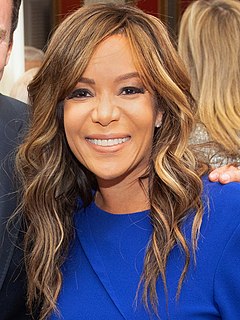A Quote by Laurence Fishburne
I actually had the opportunity to stand at the lectern in the Supreme Court and face the justices, which was really a powerful thing for me.
Related Quotes
Class warfare always sounds good. Taking action against the rich and the powerful and making 'em pay for what they do, it always sounds good. But that's not the job of the Supreme Court. The Supreme Court standing on the side of the American people? The Supreme Court adjudicates the law. The Supreme Court determines the constitutionality of things and other things. The Supreme Court's gotten way out of focus, in my opinion.
In fact, Native American Rights Fund has a project called the Supreme Court Project. And quite frankly, it's focused on trying to keep cases out of the Supreme Court. This Supreme Court, Justice Roberts is actually, hard to believe, was probably worse than the Rehnquist Court. If you look at the few decisions that it's issued.
Today, no less than five Supreme Court justices are on record, either through their opinions or speeches (or both), that they will consult foreign law and foreign-court rulings for guidance in certain circumstances. Of course, policymakers are free to consult whatever they want, but not justices. They're limited to the Constitution and the law.
I am very proud of our Supreme Court - it is one of the best worldwide. Nevertheless, since the 1990s, we have seen a certain imbalance in the relationship between the judiciary, the parliament and the government. The Supreme Court behaved in an activist way. We have to debate the degree to which such Supreme Court activism is appropriate.
The notion that the Supreme Court comes up with the ruling and that automatically subjects the two other branches to following it defies everything there is about the three equal branches of government. The Supreme Court is not the supreme branch. And for God's sake, it isn't the Supreme Being. It is the Supreme Court.
When it comes to the Supreme Court, the American people have only two times when they have any input into how our Constitution is interpreted and who will have the privilege to do so.First, we elect a president who has the power to nominate justices to the Supreme Court.Second, the people, acting through their representatives in the Senate, have their say on whether the president's nominee should in fact be confirmed.
We often imagine that the court serves as a sort of neutral umpire controlling the warring political branches. But this is mostly myth. The justices of the Supreme Court are themselves actors in the struggle for power, and when they intervene, they think carefully about how their decisions will affect the court's own legitimacy and authority.

































